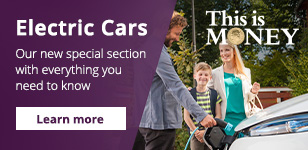Third of drivers don’t want electric and will stick with petrol
A third of Britons will refuse to drive electric: an Auto Trader poll shows one in three plan to stick with petrol and diesel cars until they stop driving
A third of motorists say they will never buy an electric car, even after the government introduces a ban on the sale of new petrol and diesel models at the end of the decade.
The results of a poll of 1,467 motorists showed that one in three are not interested in switching to a battery-powered car at any time.
They pledged to keep their current engine or buy second-hand internal combustion engine cars until they hang up their driving gloves for good and surrender their licenses.
This is despite the fact that electric vehicles are widely predicted to become cheaper in the coming years, while already offering much lower running costs.
‘EV isn’t for me!’: A poll shows a third of Britons will refuse to ever own an electric car and will continue to drive petrol and diesel models until they surrender their licenses
When asked what factors would encourage them to switch to an electric model, the Auto Trader survey found that 32 percent of motorists never intend to buy an electric car, regardless of the incentives offered.
For those more open to the switch, 30 percent said they would only be interested if the initial cost of EVs dropped dramatically.
The car sales platform says a typical electric car today costs 36 percent more than a comparable petrol or diesel model, while Auto Trader says there needs to be a drastic increase in affordable models to help more motorists consider upgrading their petrol and diesel engines. .
One of the most affordable and most popular electric cars in the UK – the MG ZS Electric – costs almost £8,400 more than its conventional fuel equivalent of £25,465.
Ian Plummer, commercial director at Auto Trader, said: “We are now less than seven years away from banning new petrol and diesel sales in the UK under the government’s 2030 ambitions, so it is extremely worrying that a third of the motorists says they’ll just never switch.
“The market is suffering from a lack of affordable EV models, which newcomers should eventually start this year, but there are also concerns about the charging network.
“If we are to deliver on ambitions for a greener, fairer society, ministers must be prepared to use the tax system to incentivize drivers to ensure they meet their goals – and a 20 per cent VAT cut on public charges would be a good start.” are. ‘

Auto Trader said the government needs to take action to encourage more people to switch from internal combustion engine cars to electric vehicles, including by helping to lower prices and reduce the cost of charging
In terms of other changes drivers said they would like to see before considering buying an electric car, more than one in ten (11 percent) advocated a scrapping scheme for petrol and diesel vehicles to help reduce the cost of an electric model.
Another 7 percent said cheaper public EV charging would also encourage them to switch.
At the moment, not only are public charging station rates significantly higher than private users, particularly when using off-peak rates, but public charging points also charge 20 percent VAT, compared to a VAT rate of just 5 percent for those who can charge their car at home.
Auto Trader has calculated that EVs are typically £87 per 1,000 miles cheaper to drive than petrol or diesel cars – although this could change drastically depending on the Chancellor’s decision whether the fuel duty freeze should continue (including the reduction of 5 pence per litre). introduced a year ago) in next week’s budget.
The Auto Trader survey found that nearly half – or 47 percent – would oppose electric driving even after a fuel tax hike.
The chancellor announced in November’s autumn statement that electric vehicles will also become subject to motor vehicle tax from 2025, further reducing their financial benefits for drivers and curbing potential demand – unlike in previous years when the government encouraged switching through various financial incentives to to offer.

